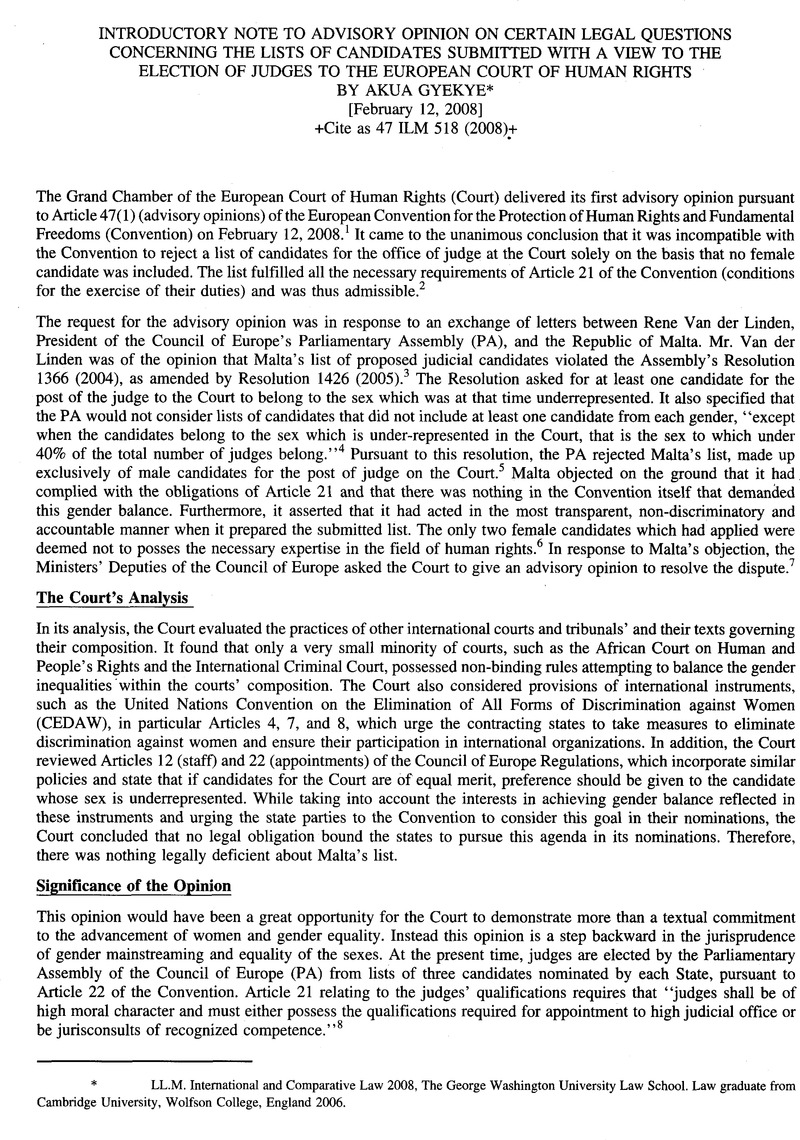Published online by Cambridge University Press: 27 February 2017

1 The first request from the Committee of Ministers for an advisory opinion was held by the Court not to come within its advisory opinion on June 2, 2004. The request concerned the co-existence of the Convention on Human Rights of the Commonwealth of Independent States and the European Convention on Human Rights.
2 See Advisory Opinion on Certain Legal Question Concerning the Lists of Candidates Submitted with a View to the Election of Judges to the European Court of Human Rights, Feb. 12, 2008, available at <http://www.echr.coe.int/ECHR/EN/Header/Press/News/Archived+news/> [hereinafter Advisory Opinion].
3 Id. at ¶¶ 8-14.
4 Id. at ¶ 20.
5 Id. at ¶ 9.
6 Id. at ¶ 10.
7 Two questions were submitted: 1. Can a list of candidates for the post of judge at the European Court of Human Rights, which satisfies the criteria listed in Article 21 of the Convention, be refused solely on the basis of gender-related issues, and 2. Are Resolution 1366 (2004) and Resolution 1426 (2005) in breach of the Assembly's responsibilities under Article 22 of the Convention to consider a list, or a name on such list, on the basis of the criteria listed in Article 21 of the Convention?
8 The Convention for the Protection of Human Rights and Fundamental Freedoms, Art. 21 (criteria for office) [hereinafter European Convention on Human Rights].
9 See Advisory Opinion, supra note iii, at ¶¶ 49-51, 52.
10 Id at ¶ 27 (discussing the explanatory memorandum for the rejection of a draft resolution by the Committee on Legal Affairs and Human Rights to the Assembly).
11 Judge Rosalyn Higgins from the United Kingdom was elected to the Court in 1995. Suzanne Bastid was appointed as judge ad hoc in Application for Revision and Interpretation of the Judgment of 24 February 1982 in the Case Concerning the Continental Shelf (Tunisia/Libyan Arab Jamahiriya) (Tunis, v. Libya), 1985 I.C.J. 192 (Dec. 10). Hilary Charlesworth, Transforming the United Nations Men's Club: Feminist Futures for the United Nations, 4 Transnat'l L. & Contemp. Probs. 421 (1994), at 425.
12 Neill Nugent, The Government And Politics Of The European Union 293 (2006).
13 Marie-Bénédicte Dembour. Who Believes In Human Rights?: Reflection On The European Convention 191 (2006). See also European Court of Human Rights, Composition of the Court, available at <http://www.echr.coe.int/ECHR/EN/Header/The+Court/The+Court/Composition+of+the+Court/>.
14 See William J. Aceves, Critical Jurisprudence and International Legal Scholarship: A Study of Equitable Distribution, 39 Colum. J. Transnat'l L. 299 (2001) (discussing in general terms the benefit of increasing diversity in the composition of international organizations).
15 See, e.g., the 1995 Beijing Declaration and Platform for Action specifically encouraging the selection of women to international tribunals; see also Report of the Fourth World Conference on Women, U.N. Doc. A/CONF. 177/20 (Oct. 17, 1995), at ¶ 142 (asking States to “[a]im for gender balance when nominating or promoting candidates for judicial and other positions in all relevant international bodies, such as the U.N. International Tribunals for the former Yugoslavia and for Rwanda and the International Court of Justice, as well as in other bodies related to the peaceful settlement of disputes.”). See also U.N. S.C. Res. 1325 S/RES/1325 (2000) (urging “Member States to ensure increased representation of women at all decision-making levels in national, regional and international institutions and mechanisms for the prevention, management, and resolution of conflict”).
16 Countries can propose judges who hold other citizenships. The candidates do not even have to hold European citizenship (e.g. There has been a Canadian judge in the past. Also a Swiss judge is currently representing Liechtenstein).
17 Convention, supra note ix, at art. 19 (establishing a permanent European Court of Human Rights “ [t]o ensure the observance of the engagement undertaken by the High Contracting Parties in the Convention and the Protocols thereto.”). See also id. at arts. 26-37 (establishing procedures for determining jurisdiction and admissibility); id. at arts. 38-51 (delineating guidelines for judging, court procedures, determining settlements, issuing judgments, issuing advisory opinions, and expenditures).
* This text was reproduced and reformatted from the text appearing at the European Court of Human Rights website (visited May 21, 2008) <http://cmiskp.echr.coe.int/tkpl97/view.asp?item=1&portal=hbkm&action=html&highlight=Lists%20%7C%20of%20%7C%20candidates%20%7C%20with%20%7C%20a%20%7C%20view%20%7C%20to%20%7C%20election%20%7C%20judges&sessionid=7923817&skin=hudoc-en>